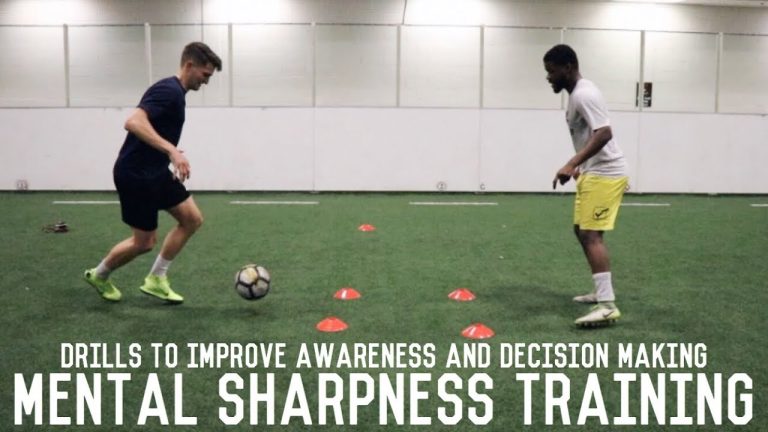In the fast-paced world of soccer, making split-second decisions can often be the difference between victory and defeat. One area where decision-making skills are crucial is in hold-up play situations. These moments require players to think quickly, assess the options available, and make the right choice to maintain possession and create scoring opportunities. Developing effective decision-making skills in hold-up play not only improves a player’s individual performance but also enhances the overall team’s attacking prowess. In this article, we will explore key techniques and strategies to help players sharpen their decision-making abilities in these critical moments on the pitch.
How can one enhance their strategic decision-making skills?
Developing strategic decision-making skills is crucial for success in any industry. A key aspect of this process is gathering and analyzing relevant data. By conducting thorough research and gathering accurate information, decision-makers can make informed choices that align with their organization’s goals. This data-driven approach not only reduces the risk of making poor decisions but also allows for a more strategic and proactive approach to problem-solving.
Another important aspect of developing strategic decision-making is fostering a culture of collaboration within the organization. Encouraging open communication and diverse perspectives can greatly enhance the decision-making process. By involving various stakeholders and considering their insights, decision-makers can gain a broader understanding of the situation at hand. This collaborative approach fosters creativity and innovation, leading to more effective and strategic decision-making.
Furthermore, continuously evaluating and adapting strategies is essential for honing strategic decision-making skills. The business landscape is constantly evolving, and what worked in the past may not be effective in the future. Regularly reviewing and reassessing strategies allows decision-makers to identify areas for improvement and make necessary adjustments. This iterative process helps in developing a forward-thinking mindset and enables decision-makers to stay ahead of the competition.
In conclusion, developing strategic decision-making skills involves gathering and analyzing data, fostering collaboration, and continuously evaluating and adapting strategies. By adopting these practices, decision-makers can make well-informed choices that align with their organization’s goals and stay ahead in an ever-changing business environment.
What is an example of effectively making decisions?
Making effective decisions is crucial in both personal and professional life. One prime example of a good decision-making process is demonstrated by a successful entrepreneur. When faced with a crucial business situation, they carefully analyze the available data, weigh the potential risks and rewards, and consider the long-term implications. This analytical approach enables them to make informed choices that align with their goals and maximize their chances of success.
Another example of effective decision-making can be witnessed in the field of medicine. Doctors often make critical decisions under immense pressure, where the stakes are high and lives are at risk. By utilizing their vast knowledge, experience, and expertise, they are able to diagnose and treat patients accurately. Their ability to quickly assess the situation, consider various treatment options, and ultimately choose the most effective course of action showcases their exemplary decision-making skills.
In everyday life, the decision to prioritize one’s mental and physical well-being is an excellent example of effective decision-making. Taking time to exercise regularly, eat healthily, and get enough sleep not only improves one’s overall quality of life but also enhances productivity and mental clarity. By consciously making the choice to prioritize self-care, individuals can effectively manage stress, maintain a balanced lifestyle, and ultimately make better decisions in all areas of their lives.
What is the list of the 7 C’s of decision-making?
Decision-making is a complex process that can greatly impact the outcome of any situation. To ensure effective decision-making, it is important to consider the 7 C’s: clarity, completeness, coherence, consistency, creativity, constraints, and consequences. Firstly, clarity refers to having a clear understanding of the problem or situation at hand. It involves gathering all relevant information and defining the objective clearly. Secondly, completeness emphasizes the need to consider all available options and potential solutions. It requires thorough analysis and evaluation to ensure that no crucial information is overlooked. Lastly, coherence focuses on the logical connection between different elements of the decision. It ensures that all parts of the decision align and contribute to the overall goal.
Consistency is another crucial aspect of decision-making. It involves making choices that are in line with one’s values, principles, and organizational goals. By maintaining consistency, decision-makers can establish a sense of trust and reliability. Additionally, creativity plays a vital role in decision-making. It encourages thinking outside the box and considering innovative solutions. By embracing creativity, decision-makers can explore new possibilities and find unique approaches to complex problems. Constraints are also important to consider when making decisions. They refer to the limitations or boundaries that may impact the decision-making process. Identifying and understanding these constraints allows decision-makers to adapt and make informed choices. Lastly, understanding the consequences of a decision is crucial. Decision-makers must anticipate the potential outcomes and weigh the risks and benefits. By considering the consequences, decision-makers can make informed choices that align with their goals and minimize potential negative impacts.
Unlocking Tactical Brilliance: Mastering Decision-Making in Hold-Up Play
Unlocking Tactical Brilliance: Mastering Decision-Making in Hold-Up Play
In the fast-paced world of soccer, hold-up play is a crucial skill that separates the average players from the true greats. It requires a combination of strength, technique, and most importantly, the ability to make split-second decisions under pressure. By mastering decision-making in hold-up play, players can unlock a whole new level of tactical brilliance on the field.
When receiving the ball with their back to the goal, a player must quickly assess the situation and decide the best course of action. Should they hold onto the ball, shielding it from defenders and waiting for support? Or should they make a quick turn, leaving their marker behind and creating space for a teammate? These decisions need to be made instantly, with a clear understanding of the team’s strategy and the movement of their fellow players.
By honing their decision-making skills, players can become more effective in hold-up play, dictating the tempo of the game and creating scoring opportunities for their team. They can anticipate the movements of their teammates, make intelligent passes, and exploit gaps in the opponent’s defense. The ability to make the right decision at the right time is what separates the great hold-up players from the rest.
To master decision-making in hold-up play, players must train their minds as much as their bodies. They need to develop a deep understanding of the game, constantly analyzing situations and learning from their mistakes. They must also cultivate their instincts, trusting their gut feelings and making split-second decisions without hesitation.
In conclusion, unlocking tactical brilliance in hold-up play requires mastering decision-making. It is the ability to make quick, intelligent choices under pressure that sets players apart on the field. By developing this skill, players can become true maestros of the game, orchestrating attacks and creating scoring opportunities for their team.
Decoding Success: Enhancing Your Skills in Hold-Up Play’s Decision-Making
Decoding Success: Enhancing Your Skills in Hold-Up Play’s Decision-Making
In the fast-paced game of soccer, hold-up play’s decision-making can make or break a team’s success. Mastering this skill requires a combination of quick thinking, strategic positioning, and effective communication. By understanding the intricacies of hold-up play, players can create opportunities for their teammates, disrupt the opponent’s defense, and ultimately increase their team’s chances of scoring. It requires a keen sense of awareness, the ability to anticipate movements, and the presence of mind to make split-second decisions. Developing these skills takes time and practice, but the rewards are well worth the effort. So next time you step onto the field, remember the importance of hold-up play’s decision-making and strive to enhance your skills to unlock the path to success.
The Art of Precision: Elevating Your Decision-Making in Hold-Up Play
Paragraph 1:
In the fast-paced game of football, precision is key, especially when it comes to hold-up play. Mastering the art of precision in decision-making can elevate your performance and give you the edge over your opponents. Whether it’s knowing when to shield the ball, make a pass, or take a shot, every decision you make in hold-up play should be calculated and executed with utmost precision.
Paragraph 2:
One crucial aspect of precision in hold-up play is the ability to assess the situation quickly and accurately. By scanning the field, analyzing the positioning of your teammates and opponents, and anticipating their movements, you can make informed decisions that maximize your team’s chances of success. Precision in decision-making also involves understanding your own strengths and limitations, allowing you to choose the most effective course of action in any given moment.
Paragraph 3:
Furthermore, mastering the art of precision in hold-up play requires mental sharpness and composure. It’s not just about making split-second decisions, but also about staying calm under pressure and maintaining a clear mind. By honing your focus and tuning out distractions, you can make precise decisions that reflect your true abilities. With practice and experience, precision in decision-making becomes second nature, leading to more successful hold-up plays and ultimately enhancing your overall performance on the field.
In the fast-paced world of soccer, developing decision-making skills in hold-up play situations is crucial for success on the field. By honing in on their ability to assess multiple options, anticipate the movements of teammates and opponents, and execute precise actions, players can elevate their game to new heights. The mastery of decision-making in hold-up play not only fosters a deeper understanding of the game but also enhances a player’s versatility and effectiveness. As they navigate through the complexities of these situations, players become more adept at making split-second choices that can make all the difference between victory and defeat. So, whether it’s holding up the ball to bring teammates into play or creating scoring opportunities for themselves, the development of decision-making skills in hold-up play is a vital aspect of every soccer player’s journey towards excellence.



